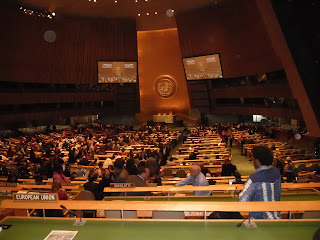 |
| Photo Credit: UNPFII |
During this year’s Permanent Forum on Indigenous Issues the World Bank engaged with Indigenous Peoples in a number of formal and informal sessions. Formally these engagements took place during plenary sessions of the Permanent Forum and informally during side events and organized dialogues. The size of the World Bank's team attending the Forum, which came up to 30 people in comparison to just a handful during last year's event, demonstrates the increased relevance the institution places on recognizing indigenous peoples as an important constituent in its work.
The World Bank’s most important item of engagement was the review process with respect to its social and environmental safeguards that the World Bank is currently undertaking, which include a policy on indigenous peoples (Operational Policy 4.10). As the current policy was drafted in 2005, many of the numerous comments made by Indigenous Peoples during the discussions related to a demand to bring the policy in line with the UN Declaration on the Rights of Indigenous Peoples (UNDRIP 2007), including the right to free, prior and informed consent (FPIC). Furthermore, representatives called on the World Bank to not only examine the impact of UNDRIP on OP 4.10 but on all of the Bank’s policies. It was highlighted that the importance of updating OP 4.10 cannot be overestimated, as in 2012 alone the safeguards were triggered by 20% of all World Bank projects, not including projects where they potentially should have been triggered but were not.









.jpg)




.jpg)


